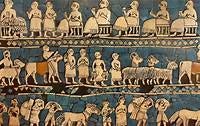The following is rather dense and can be skipped by the practical but will appeal to the curious. These are half thoughts, awkward, and still being mulled over. Archimedes proposed that given a fulcrum and a long enough lever, he could move the world. I have been arguing that nations are too segmented from each other to be able to mobilize the global movements necessary to cut CO2 and temperature rise.
I have looked intoPitrim Sorokin hoping to find some leverage point to reverse climate dynamics and prevent the worst. Sorokin treats only two paradigms: materialist and idea-centered cultures. He treats civilizations as high-end organization of material or spiritual being. . His focus is either on cultures that are basically mental and based on ideas, or sensate, which are more materialist and mechanical. The idea-centered vs materialist (Greece vs Rome) civilizations are, obviously more prone to the impact of ideas and hence possibly more open to cross-border actions.
An example he gives of the two cultures, ideational and materist.
Is one of the schemas more likely to provide the lever and fulcrum to move climate change? If we think of religious cultures, it is clear that ideas can spread very rapidly across borders. Imagine a handful of marbles in a puddle of milk. The marbles have a clear form and specific locations like nations, but the puddle of milk is more vague and formless. Nation-states are like the marbles defined by clear forms whereas cultures and civilizations are more like the puddle, their form rather formless and less stable/
Culture and civilization are two distinct non-state modes of organization with culture having much loser boundaries with easier penetration across borders and hence a greater chance of a new universalism that could allow an anti-fossil fuel culture to emerge.
Here is what a bot has to say (Based on Braudel)
Content: Culture Vs Civilization
Culture:
Meaning: Culture encompasses the shared beliefs, values, customs, traditions, language, arts, and social institutions of a group of people.
What It Represents: Culture reflects what we are as individuals and as a society. It’s the essence of our collective identity.
Expression: Culture finds expression in various forms such as religion, art, dance, literature, customs, morals, music, and philosophy.
Advancement: Culture doesn’t necessarily imply advancement; it’s more about inner refinement and the richness of human experience.
Interdependency: Culture can exist and evolve independently of civilization.
Civilization:
Meaning: Civilization refers to the complex social, political, and economic organization of human society. It represents the advanced stage of human development and organization.
What It Represents: Civilization is what we possess collectively—our laws, administration, infrastructure, architecture, and social arrangements.
Expression: It’s expressed through tangible elements like legal systems, technological advancements, and organized governance.
Advancement: Civilization implies progress and development. It’s intentional.
Interdependency: Civilization cannot grow and exist without culture as its foundation.
In summary, culture is the soul, while civilization is the body. They coexist without fully overlapping, shaping our world in intricate ways. It is clear that nationsto limit , cultures and civilizations are powerfully different ways of organizing human minds. Think of the prohibition against pork in the Middle East, a social need (avoid disease) turned into a religious stateofto limit mind.
The question then is, to cope with climate and finding the leverage to limit fossil fuel, should we be looking at culture or civilization? In summary, it seems to me that cultures are attitudes toward life and civilizations are the sanctioned procedures of living.
This means we need both if we the to deal with climate because methods have to be based on values. States without values are like rowboats loose in a storm. But the state can be the point where new technology can mobilize, dragging the culture (new values stirred up by technology) and civilization - the social organization of society to assimilate the new tech toward serious change. It is clear that religions have less viscosity than states and just might be the place where an anti-fossil fuel culture could quickly arise.




